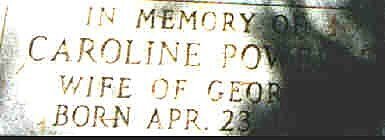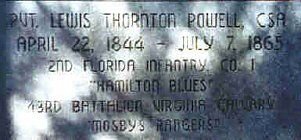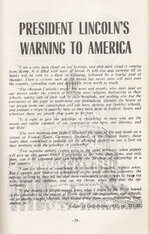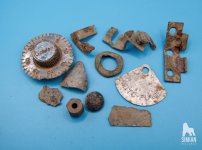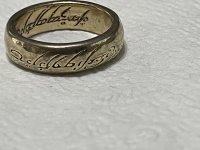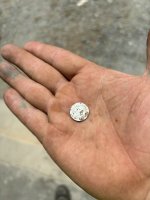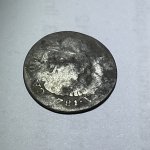pegleglooker
Bronze Member
- Jun 9, 2006
- 1,857
- 237
- Detector(s) used
- ace 250
- Primary Interest:
- All Treasure Hunting
Lincoln's assassination
Hello All,
First let me start by saying there may not be any monetery reward on this legend. That doesn't mean that the story does not carry a unique and interesting treasure.
We all know that Pres. Lincoln was killed at Ford's Theater on April 14th 1865. But the " whole " story leading up to and after his death is something that one must read. This will not be a light compliation of facts and legend but more a collection of as much info as we can find.I also hope to enlist the help of some of the best resarchers on the net ( That you guys and gals ). So let's start with the basics:
John Wilkes Booth, born May 10, 1838, was an actor who performed throughout the country in many plays. He was the lead in some of William Shakespeare's most famous works. Additionally, he was a racist and Southern sympathizer during the Civil War. He hated Abraham Lincoln who represented everything Booth was against. Booth blamed Lincoln for all the South's ills. He wanted revenge.
In late summer of 1864 Booth began developing plans to kidnap Lincoln, take him to Richmond (the Confederate capital), and hold him in return for Confederate prisoners of war. By January, 1865, Booth had organized a group of co-conspirators that included Samuel Arnold, Michael O'Laughlen, John Surratt, Lewis Powell (also called Lewis Paine or Payne), George Atzerodt, and David Herold. Additionally, Booth met with Dr. Samuel Mudd both in Maryland (where Mudd lived) and Washington, and he began using Mary Surratt's boardinghouse to meet with his co-conspirators.
On March 17, 1865, the group planned to capture Lincoln who was scheduled to attend a play at a hospital located on the outskirts of Washington. However, the president changed plans and remained in the capital. Thus, Booth's plot to kidnap Lincoln failed.
On April 9, 1865, General Robert E. Lee surrendered to General Ulysses S. Grant at Appomattox. Two days later Lincoln spoke from the White House to a crowd gathered outside. Booth was present as Lincoln suggested in his speech that voting rights be granted to certain blacks. Infuriated, Booth's plans now turned in the direction of assassination.
On the morning of Friday, April 14, Booth dropped by Ford's Theatre and learned that the president and General Grant were planning to attend the evening performance of Our American Cousin. He held one final meeting with his co-conspirators. He said he would kill Lincoln at the theater (he had since learned that Grant had left town). Atzerodt was to kill Vice-President Andrew Johnson at the Kirkwood House where Johnson resided. Powell was assigned to kill Secretary of State William Seward. Herold would accompany Powell. All attacks were to take place simultaneously at approximately 10:15 P.M. that night. Booth hoped the resulting chaos and weakness in the government would lead to a comeback for the South.
The presidential party arrived at Ford's at about 8:30 P.M. Armed with a single shot derringer and a hunting knife, Booth arrived at Ford's at about 9:30 P.M. Joseph Burroughs, a boy who worked at the theater, held his horse in the rear alley. Booth went next door to a saloon for a drink. He entered the front of Ford's Theatre around 10:07 P.M. Slowly he made his way toward the State Box where the Lincolns were sitting with Clara Harris and Henry Rathbone. Lincoln's bodyguard, John Parker of the Metropolitan Police Force, had left his post. At about 10:15 P.M. Booth opened the door to the State Box, shot Lincoln in the back of the head at near point-blank range, and struggled with Rathbone. Booth stabbed Rathbone in the arm and jumped over 11 feet to the stage below. When he hit the floor he snapped the fibula bone in his left leg just above the ankle. Many in the theater thought he yelled "Sic Semper Tyrannis" (Latin for "As Always to Tyrants"). Mrs. Lincoln screamed, Booth flashed his knife at the audience, and he made his way across the stage in front of more than 1,000 people. Everything happened so fast that no one had time to stop him. Booth went out the back door, climbed on his horse, and escaped from the city using the Navy Yard Bridge.
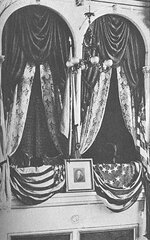
Atzerodt made no attempt to kill Johnson, and Powell stabbed Seward but failed to kill him. Herold escaped from the capital using the same bridge as Booth. The two met in Maryland and stopped briefly around midnight at Mary Surratt's leased tavern in Surrattsville where Mrs. Surratt had earlier left the message to have supplies ready and had dropped off a wrapped package that contained Booth's field glasses. About 4:00 A.M. Booth and Herold arrived at Dr. Mudd's home where Mudd set and splinted Booth's broken leg. Back in Washington Lincoln never regained consciousness and passed away at 7:22 A.M. on the morning of April 15, 1865, at the Petersen House (across the street from the theater).
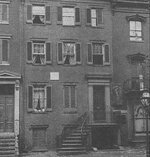
Booth and Herold departed from Dr. Mudd's during the afternoon of April 15 and traveled south. Federal authorities caught up with them at Garrett's farm near Port Royal, Virginia, early in the morning of April 26. Hiding in a barn, Harold gave up. Booth refused, so the barn was set on fire. Booth still didn't come out and was shot to death by Sergeant Boston Corbett. Corbett had not been under orders to do this. Booth's body was searched, and a diary was among the things found. Booth's remains were returned to Washington where positive identification was made and an autopsy performed.
Within days the government arrested Booth's co-conspirators (except John Surratt). A military tribunal tried them, and all were found guilty. Mrs. Surratt, Powell, Atzerodt, and Herold were all hanged on July 7, 1865. Dr. Mudd, O'Laughlen, and Arnold were given life terms in prison. Edman "Ned" Spangler, a Ford's stagehand who was convicted of helping Booth escape from the theater, received a sentence of six years in prison. The convictions of Mary Surratt and Dr. Mudd have been hotly debated throughout the years. John Surratt escaped to Canada and then to Europe. He was captured abroad and was tried in 1867 in a civil court. The trial ended with a deadlocked jury, and Surratt went free. O'Laughlen died in prison (Ft. Jefferson in the Dry Tortugas near Key West) in 1867. President Andrew Johnson pardoned Dr. Mudd, Arnold, and Spangler early in 1869.
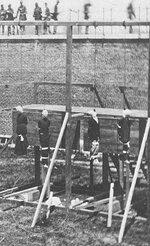
And now for the conspiracies:
LINCOLN ASSASSINATION THEORIES: A SIMPLE CONSPIRACY OR A GRAND CONSPIRACY?
John Wilkes Booth shot Abraham Lincoln on April 14, 1865, and questions arose almost immediately. Was Booth solely responsible for the assassination? Or was Booth simply a tool in a much larger conspiracy? Just who may or may not have been involved with Booth has been the subject of profound speculation among writers, historians, and others for over 140 years now. With the publication of new books and articles in the 1980's, 1990's, and beyond, the quest to find what really happened has continued. This page will attempt to outline the major conspiracy theories (in no particular order) that have been promulgated since 1865.
THEORY #1
ANDREW JOHNSON WAS INVOLVED WITH BOOTH
Approximately seven hours before shooting the president, Booth dropped by the Washington hotel which was Vice-President Andrew Johnson's residence. Upon learning from the desk clerk that neither Johnson nor his private secretary, William A. Browning, was in the hotel, Booth wrote the following note: "Don't wish to disturb you Are you at home? J. Wilkes Booth." Browning testified before the military court that he found the note in his box later that afternoon. Did Johnson and Booth know each other? In the 1997 publication "Right or Wrong, God Judge Me" The Writings of John Wilkes Booth edited by John Rhodehamel and Louise Taper it is stated on p. 146 that Booth had previously met Johnson in Nashville in February, 1864. At the time Booth was appearing in the newly opened Wood's Theatre. Also, author Hamilton Howard in Civil War Echoes (1907) made the claim that while Johnson was military governor of Tennessee, he and Booth kept a couple of sisters as mistresses and oftentimes were seen in each other's company. Lincoln had essentially ignored Johnson after Johnson's embarrassing behavior on Inauguration Day. Mary Todd Lincoln felt Johnson was involved. On March 15, 1866, she wrote to her friend, Sally Orne:
"...that, that miserable inebriate Johnson, had cognizance of my husband's death - Why, was that card of Booth's, found in his box, some acquaintance certainly existed - I have been deeply impressed, with the harrowing thought, that he, had an understanding with the conspirators & they knew their man... As sure, as you & I live, Johnson, had some hand, in all this..."
Mary Todd Lincoln to her friend, Sally Orne, in a letter dated March 15, 1866
Some members of Congress also thought Johnson was involved and a special Assassination Committee was established to investigate any evidence linking Johnson to Lincoln's death. Nothing suspicious was ever found by the committee; yet a belief by some Americans that Johnson was somehow involved with Booth continued for many years.
THEORY #2
LINCOLN DIED BY WAY OF A SIMPLE CONSPIRACY ORGANIZED BY JOHN WILKES BOOTH
This theory has John Wilkes Booth as the mastermind and that all remaining conspirators, with the one exception of John Surratt, were either hanged or sent to prison at Ft. Jefferson. Among the books that have supported this theory are Clara Laughlin's The Death of Lincoln: The Story of Booth's Plot, His Deed, and the Penalty, David M. DeWitt's The Assassination of Abraham Lincoln and Its Expiation, and George S. Bryan's The Great American Myth. The simple conspiracy theory paints Booth as a Southern patriot and racist who originally planned to kidnap the president, take him to Richmond, and hold him in exchange for Southern prisoners of war. When the kidnapping plans fell through, Booth turned to assassination as his means for revenge. The entire plot consisted simply of John Wilkes Booth as the leader of a small band of co-conspirators. In 2004 Michael W. Kauffman's encyclopedic American Brutus: John Wilkes Booth and the Lincoln Conspiracies was published. Kauffman paints Booth as a master at manipulating people, not as a stooge for others.
THEORY #3
LINCOLN'S ASSASSINATION WAS THE RESULT OF A CONFEDERATE PLOT
The idea that Lincoln was killed as part of a grand conspiracy of Confederates arose almost immediately after the assassination. Coded letters found in Booth's trunk back at the National Hotel tied him to the Confederacy. This theory has undergone a marked revival in the past 20 years. In 1977 a statement conspirator George Atzerodt made before the trial in 1865 was uncovered. In it Atzerodt told of Booth's knowledge of a Confederate plot to blow up the White House. The hypothesis of a Confederate grand conspiracy was detailed in 1988 by William A. Tidwell, James O. Hall, and David Winfred Gaddy in Come Retribution: The Confederate Secret Service and the Assassination of Lincoln. Tidwell supplied further evidence in 1995 with the publication of April '65: Confederate Covert Action in the American Civil War. (Another work which stresses Confederate involvement, but lacks the detail of the aforementioned books, is Larry Starkey's Wilkes Booth Came to Washington.) Proponents of the Confederate grand conspiracy point out that as the Confederacy's situation deteriorated, more daring and reckless planning was needed. Lincoln was viewed as a legitimate wartime target. This was especially true after the Union's failed Dahlgren raid on Richmond that had been approved by Lincoln himself and was evidence of Lincoln's increasing determination to take whatever steps were necessary to end the war. Colonel Ulrich Dahlgren was killed in the raid, and on his person several documents were found, one of which said, "The men must be kept together, and well in hand, and once in the city, it must be destroyed and Jeff Davis and his cabinet killed." Lincoln had hand-picked Dahlgren for the raid, and the Confederate government now believed the Union president had ordered Davis's death.
Confederate grand conspiracy theorists feel Judah Benjamin, the Confederate Secretary of State, was deeply involved in the plot to kidnap/kill Abraham Lincoln. He burned all of his records before Richmond was evacuated. Benjamin escaped to England, and he was the only member of the Confederate government never to return to the United States. He practiced law in England until 1883 and died in Paris on May 6, 1884.
The theory of a Confederate grand conspiracy portrays Booth as a rebel agent working to organize a band of men to kidnap Lincoln. When Richmond fell, the plans turned to assassination. First, there was the failed effort to blow up the White House followed by the successful effort to kill Lincoln at the theater. Just as Lincoln may have ordered the killing of Jefferson Davis and his Cabinet by Ulrich Dahlgren and his men, Judah Benjamin and Jefferson Davis were involved in the plans to kidnap and later assassinate Abraham Lincoln. The theory of Confederate complicity in the assassination of Abraham Lincoln is accepted by many of the current Lincoln assassination historians, scholars, researchers, and writers. The actual trigger for Booth's actions was the April 10th capture of explosives expert Thomas F. Harney who was on his way to Washington to bomb the White House. Booth, knowing Harney's mission had failed, tried to make up for Harney's disaster by taking matters into his own hands and killing the president at Ford's Theatre. For details on this theory see the articles entitled "Who Ordered Lincoln's Death?" by James E.T. Lange and Katherine DeWitt in the June 1998 edition of North & South magazine and "The Lincoln Assassination Revisited" by William Hanchett and "Risking the Wrath of God" by Edward Steers, Jr. in the September 2000 issue of North & South. Confederate plans to blow up the White House seem to be confirmed by George Atzerodt's Lost Confession.
THEORY #4
LINCOLN'S ASSASSINATION WAS THE RESULT OF A CONSPIRACY OF POWERFUL INTERNATIONAL BANKERS
This theory is that Abraham Lincoln was killed as a result of his monetary policies. John Wilkes Booth would be seen as a hired gun. In its simplest terms, the theory is that Lincoln needed money to finance the Civil War. Bankers in Europe led by the Rothschilds offered him loans at high interest rates. Rather than accept the loans, Lincoln found other means to fund the war effort. More importantly, the British bankers opposed Lincoln's protectionist policies. Some Englishmen in the 1860's believed that "British free trade, industrial monopoly and human slavery travel together." Lincoln's policies after the Civil War would have destroyed the Rothschilds' commodity speculations. After the war, Lincoln planned a mild Reconstruction policy which would have enabled a resumption of agriculture production. The Rothschilds were betting the other way on high prices caused by a tough Reconstruction policy toward the South. Lincoln was viewed as a threat to the established order of things, and he was assassinated as a result. The goal was to weaken the United States so the Rothschilds could takeover its economy. An article titled "The Rothschilds' International Plot to Kill Lincoln" was published October 29, 1976, in New Solidarity.
THEORY #5
THE ROMAN CATHOLIC CHURCH WAS BEHIND LINCOLN'S ASSASSINATION
The Jesuit Connection
In 1886 an ex-priest by the name of Charles Chiniquy (pictured to the left) wrote a book titled Fifty Years in the Church of Rome which portrayed the assassination of Lincoln as a Catholic grand conspiracy. Chiniquy maintained that Jefferson Davis had offered $1,000,000 if someone would "kill the author of the bloodshed." Chiniquy wrote that the money could be offered, but that "...the Jesuits alone could select the assassins, train them, and show them a crown of glory in heaven..." Booth was the tool of the Jesuits. He was corrupted and directed by the Vatican. In 1906 Chiniquy said, "The President, Abraham Lincoln, was assassinated by the priests and the Jesuits of Rome." In 1856 Lincoln had defended Chiniquy in court. Chiniquy had quarreled with his bishop and then was sued for slander by one of the bishop's friends (the bishop himself having nothing to do with the complaint). A morals charge was also involved. The case was heard May 20-22, 1856, in Urbana, Illinois. Lincoln arranged for a compromise settlement, but Chiniquy interpreted the settlement as a victory over the church. He felt some Jesuits held Lincoln responsible for the settlement. In 1897 Thomas M. Harris, a member of the 1865 military commission, wrote a book entitled Rome's Responsibility for the Assassination of Abraham Lincoln. Other books that involve the Roman Catholic Church in Lincoln's assassination include DEMOCRACY UNDER SIEGE The Jesuits' Attempt to Destroy the Popular Government of the United States: The True Story of Abraham Lincoln's Death by C.T. Wilcox and The Suppressed Truth about the Assassination of Abraham Lincoln by Burke McCarty (1924). McCarty's opening sentence was, "In all the bloody history of the Papacy, perhaps in no one man, as in Abraham Lincoln, was there concentrated such a multitude of reasons for his annihilation by that system." An Inquiry into the Assassination of Abraham Lincoln by Emmett McLoughlin was published in 1963. Among other points, McLoughlin maintained that the majority of American Catholics were in favor of slavery and opposed to Lincoln. The author said the totalitarian Papacy considered Lincoln a major enemy, and that the Church for centuries had "been involved in numerous instances of the forcible removal of heads of state whom it condemned."
THEORY #6
SECRETARY OF WAR EDWIN STANTON WAS THE MASTERMIND BEHIND LINCOLN'S ASSASSINATION
In 1937 Otto Eisenschiml's Why Was Lincoln Murdered was published. The book espoused the hypothesis that Secretary of War Edwin Stanton was directly involved in Lincoln's death. It alleged that Stanton was against Lincoln's mild Reconstruction policies and wanted him out of office so a more radical Reconstructionist policy could be employed. On the day of the assassination Ulysses S. Grant was expected to attend Our American Cousin with the Lincolns. Eisenschiml argued that had Grant attended, the military guards who protected him would never have allowed Booth to enter the State Box at Ford's Theatre. Eisenschiml further argued that Grant's refusal of the Lincolns' theater invitation was due to an order by Stanton to change his plans for the evening. Eisenschiml's theory was that Grant's absence left Lincoln vulnerable. Stanton was also alleged to have known that conspirators were meeting at the Surratt boardinghouse, and that he refused to release from duty the powerful Major Thomas T. Eckert after Lincoln asked for him as a bodyguard (falsely stating that Eckert had vital work to do at the War Department's Telegraph Office). Eisenschiml continued from there to make a case against Stanton by examining an entire series of events following Booth's shot. Nearly every move Stanton made is seen as suspicious and containing an ulterior motive. Among these behaviors and events were not alerting the security at the Navy Yard Bridge (over which Booth escaped), the mysterious interruption of telegraph communications, secretly arranging to have Booth killed before being brought to trial, and the suppression of evidence by removing pages from Booth's diary. Between the publication of Why Was Lincoln Murdered and the late 1970's, other books were published which supported and amplified Eisenschiml's hypothesis. For example, Theodore Roscoe's The Web of Conspiracy (1959) found Stanton's behavior very suspect. Other high government officials were also implicated.
Further evidence against Stanton was discovered by chemist Ray Neff who found cipher messages allegedly written in 1868 by Lafayette Baker, head of the National Detective Police, which implicated himself, the Secretary of War, and many others including Congressmen. David Balsiger and Charles E. Sellier's 1977 publication, The Lincoln Conspiracy, was made into a major motion picture. However, during the past 20 years, research has clearly tended to vindicate Edwin Stanton. In hindsight, behavior by Stanton that appears to be linked to a conspiracy has been shown to be innocent and in some cases, fabricated. Current scholarship indicates plausible explanations for the actions Eisenschiml and other authors of the 1937-1977 era found suspicious. One good source for those wishing to read about the vindication of Edwin Stanton is Section 3 of Part Five (pp. 170-177) of Stephen B. Oates' Abraham Lincoln: The Man Behind the Myths. Also, there is a page on the web on this subject CLICK HERE. A recent book which revives the Stanton suspicions is Robert Lockwood Mills' 1994 publication of It Didn't Happen The Way You Think. The Lincoln Assassination: What The Experts Missed.
Dr. William Hanchett's closing sentences in The Lincoln Murder Conspiracies are as follows: "Lincoln would not have enjoyed the extravagant and pseudoreligious praise being offered in his name by so many Americans. Possibly he would have been reminded of some anecdote by which to deflate the absurdities of such exaggerations. But one suspects that if he could learn of the slush written about the suggested involvement of his secretary of war in his own death he would simply become angry."
( All of the above is from http://home.att.net/~rjnorton/Lincoln74.html )
Ok, now it's time for all of you Civil war buffs to chime in and let the discussion begin...... I have more but this is just a start..
PLL
Hello All,
First let me start by saying there may not be any monetery reward on this legend. That doesn't mean that the story does not carry a unique and interesting treasure.
We all know that Pres. Lincoln was killed at Ford's Theater on April 14th 1865. But the " whole " story leading up to and after his death is something that one must read. This will not be a light compliation of facts and legend but more a collection of as much info as we can find.I also hope to enlist the help of some of the best resarchers on the net ( That you guys and gals ). So let's start with the basics:
John Wilkes Booth, born May 10, 1838, was an actor who performed throughout the country in many plays. He was the lead in some of William Shakespeare's most famous works. Additionally, he was a racist and Southern sympathizer during the Civil War. He hated Abraham Lincoln who represented everything Booth was against. Booth blamed Lincoln for all the South's ills. He wanted revenge.
In late summer of 1864 Booth began developing plans to kidnap Lincoln, take him to Richmond (the Confederate capital), and hold him in return for Confederate prisoners of war. By January, 1865, Booth had organized a group of co-conspirators that included Samuel Arnold, Michael O'Laughlen, John Surratt, Lewis Powell (also called Lewis Paine or Payne), George Atzerodt, and David Herold. Additionally, Booth met with Dr. Samuel Mudd both in Maryland (where Mudd lived) and Washington, and he began using Mary Surratt's boardinghouse to meet with his co-conspirators.
On March 17, 1865, the group planned to capture Lincoln who was scheduled to attend a play at a hospital located on the outskirts of Washington. However, the president changed plans and remained in the capital. Thus, Booth's plot to kidnap Lincoln failed.
On April 9, 1865, General Robert E. Lee surrendered to General Ulysses S. Grant at Appomattox. Two days later Lincoln spoke from the White House to a crowd gathered outside. Booth was present as Lincoln suggested in his speech that voting rights be granted to certain blacks. Infuriated, Booth's plans now turned in the direction of assassination.
On the morning of Friday, April 14, Booth dropped by Ford's Theatre and learned that the president and General Grant were planning to attend the evening performance of Our American Cousin. He held one final meeting with his co-conspirators. He said he would kill Lincoln at the theater (he had since learned that Grant had left town). Atzerodt was to kill Vice-President Andrew Johnson at the Kirkwood House where Johnson resided. Powell was assigned to kill Secretary of State William Seward. Herold would accompany Powell. All attacks were to take place simultaneously at approximately 10:15 P.M. that night. Booth hoped the resulting chaos and weakness in the government would lead to a comeback for the South.
The presidential party arrived at Ford's at about 8:30 P.M. Armed with a single shot derringer and a hunting knife, Booth arrived at Ford's at about 9:30 P.M. Joseph Burroughs, a boy who worked at the theater, held his horse in the rear alley. Booth went next door to a saloon for a drink. He entered the front of Ford's Theatre around 10:07 P.M. Slowly he made his way toward the State Box where the Lincolns were sitting with Clara Harris and Henry Rathbone. Lincoln's bodyguard, John Parker of the Metropolitan Police Force, had left his post. At about 10:15 P.M. Booth opened the door to the State Box, shot Lincoln in the back of the head at near point-blank range, and struggled with Rathbone. Booth stabbed Rathbone in the arm and jumped over 11 feet to the stage below. When he hit the floor he snapped the fibula bone in his left leg just above the ankle. Many in the theater thought he yelled "Sic Semper Tyrannis" (Latin for "As Always to Tyrants"). Mrs. Lincoln screamed, Booth flashed his knife at the audience, and he made his way across the stage in front of more than 1,000 people. Everything happened so fast that no one had time to stop him. Booth went out the back door, climbed on his horse, and escaped from the city using the Navy Yard Bridge.

Atzerodt made no attempt to kill Johnson, and Powell stabbed Seward but failed to kill him. Herold escaped from the capital using the same bridge as Booth. The two met in Maryland and stopped briefly around midnight at Mary Surratt's leased tavern in Surrattsville where Mrs. Surratt had earlier left the message to have supplies ready and had dropped off a wrapped package that contained Booth's field glasses. About 4:00 A.M. Booth and Herold arrived at Dr. Mudd's home where Mudd set and splinted Booth's broken leg. Back in Washington Lincoln never regained consciousness and passed away at 7:22 A.M. on the morning of April 15, 1865, at the Petersen House (across the street from the theater).

Booth and Herold departed from Dr. Mudd's during the afternoon of April 15 and traveled south. Federal authorities caught up with them at Garrett's farm near Port Royal, Virginia, early in the morning of April 26. Hiding in a barn, Harold gave up. Booth refused, so the barn was set on fire. Booth still didn't come out and was shot to death by Sergeant Boston Corbett. Corbett had not been under orders to do this. Booth's body was searched, and a diary was among the things found. Booth's remains were returned to Washington where positive identification was made and an autopsy performed.
Within days the government arrested Booth's co-conspirators (except John Surratt). A military tribunal tried them, and all were found guilty. Mrs. Surratt, Powell, Atzerodt, and Herold were all hanged on July 7, 1865. Dr. Mudd, O'Laughlen, and Arnold were given life terms in prison. Edman "Ned" Spangler, a Ford's stagehand who was convicted of helping Booth escape from the theater, received a sentence of six years in prison. The convictions of Mary Surratt and Dr. Mudd have been hotly debated throughout the years. John Surratt escaped to Canada and then to Europe. He was captured abroad and was tried in 1867 in a civil court. The trial ended with a deadlocked jury, and Surratt went free. O'Laughlen died in prison (Ft. Jefferson in the Dry Tortugas near Key West) in 1867. President Andrew Johnson pardoned Dr. Mudd, Arnold, and Spangler early in 1869.

And now for the conspiracies:
LINCOLN ASSASSINATION THEORIES: A SIMPLE CONSPIRACY OR A GRAND CONSPIRACY?
John Wilkes Booth shot Abraham Lincoln on April 14, 1865, and questions arose almost immediately. Was Booth solely responsible for the assassination? Or was Booth simply a tool in a much larger conspiracy? Just who may or may not have been involved with Booth has been the subject of profound speculation among writers, historians, and others for over 140 years now. With the publication of new books and articles in the 1980's, 1990's, and beyond, the quest to find what really happened has continued. This page will attempt to outline the major conspiracy theories (in no particular order) that have been promulgated since 1865.
THEORY #1
ANDREW JOHNSON WAS INVOLVED WITH BOOTH
Approximately seven hours before shooting the president, Booth dropped by the Washington hotel which was Vice-President Andrew Johnson's residence. Upon learning from the desk clerk that neither Johnson nor his private secretary, William A. Browning, was in the hotel, Booth wrote the following note: "Don't wish to disturb you Are you at home? J. Wilkes Booth." Browning testified before the military court that he found the note in his box later that afternoon. Did Johnson and Booth know each other? In the 1997 publication "Right or Wrong, God Judge Me" The Writings of John Wilkes Booth edited by John Rhodehamel and Louise Taper it is stated on p. 146 that Booth had previously met Johnson in Nashville in February, 1864. At the time Booth was appearing in the newly opened Wood's Theatre. Also, author Hamilton Howard in Civil War Echoes (1907) made the claim that while Johnson was military governor of Tennessee, he and Booth kept a couple of sisters as mistresses and oftentimes were seen in each other's company. Lincoln had essentially ignored Johnson after Johnson's embarrassing behavior on Inauguration Day. Mary Todd Lincoln felt Johnson was involved. On March 15, 1866, she wrote to her friend, Sally Orne:
"...that, that miserable inebriate Johnson, had cognizance of my husband's death - Why, was that card of Booth's, found in his box, some acquaintance certainly existed - I have been deeply impressed, with the harrowing thought, that he, had an understanding with the conspirators & they knew their man... As sure, as you & I live, Johnson, had some hand, in all this..."
Mary Todd Lincoln to her friend, Sally Orne, in a letter dated March 15, 1866
Some members of Congress also thought Johnson was involved and a special Assassination Committee was established to investigate any evidence linking Johnson to Lincoln's death. Nothing suspicious was ever found by the committee; yet a belief by some Americans that Johnson was somehow involved with Booth continued for many years.
THEORY #2
LINCOLN DIED BY WAY OF A SIMPLE CONSPIRACY ORGANIZED BY JOHN WILKES BOOTH
This theory has John Wilkes Booth as the mastermind and that all remaining conspirators, with the one exception of John Surratt, were either hanged or sent to prison at Ft. Jefferson. Among the books that have supported this theory are Clara Laughlin's The Death of Lincoln: The Story of Booth's Plot, His Deed, and the Penalty, David M. DeWitt's The Assassination of Abraham Lincoln and Its Expiation, and George S. Bryan's The Great American Myth. The simple conspiracy theory paints Booth as a Southern patriot and racist who originally planned to kidnap the president, take him to Richmond, and hold him in exchange for Southern prisoners of war. When the kidnapping plans fell through, Booth turned to assassination as his means for revenge. The entire plot consisted simply of John Wilkes Booth as the leader of a small band of co-conspirators. In 2004 Michael W. Kauffman's encyclopedic American Brutus: John Wilkes Booth and the Lincoln Conspiracies was published. Kauffman paints Booth as a master at manipulating people, not as a stooge for others.
THEORY #3
LINCOLN'S ASSASSINATION WAS THE RESULT OF A CONFEDERATE PLOT
The idea that Lincoln was killed as part of a grand conspiracy of Confederates arose almost immediately after the assassination. Coded letters found in Booth's trunk back at the National Hotel tied him to the Confederacy. This theory has undergone a marked revival in the past 20 years. In 1977 a statement conspirator George Atzerodt made before the trial in 1865 was uncovered. In it Atzerodt told of Booth's knowledge of a Confederate plot to blow up the White House. The hypothesis of a Confederate grand conspiracy was detailed in 1988 by William A. Tidwell, James O. Hall, and David Winfred Gaddy in Come Retribution: The Confederate Secret Service and the Assassination of Lincoln. Tidwell supplied further evidence in 1995 with the publication of April '65: Confederate Covert Action in the American Civil War. (Another work which stresses Confederate involvement, but lacks the detail of the aforementioned books, is Larry Starkey's Wilkes Booth Came to Washington.) Proponents of the Confederate grand conspiracy point out that as the Confederacy's situation deteriorated, more daring and reckless planning was needed. Lincoln was viewed as a legitimate wartime target. This was especially true after the Union's failed Dahlgren raid on Richmond that had been approved by Lincoln himself and was evidence of Lincoln's increasing determination to take whatever steps were necessary to end the war. Colonel Ulrich Dahlgren was killed in the raid, and on his person several documents were found, one of which said, "The men must be kept together, and well in hand, and once in the city, it must be destroyed and Jeff Davis and his cabinet killed." Lincoln had hand-picked Dahlgren for the raid, and the Confederate government now believed the Union president had ordered Davis's death.
Confederate grand conspiracy theorists feel Judah Benjamin, the Confederate Secretary of State, was deeply involved in the plot to kidnap/kill Abraham Lincoln. He burned all of his records before Richmond was evacuated. Benjamin escaped to England, and he was the only member of the Confederate government never to return to the United States. He practiced law in England until 1883 and died in Paris on May 6, 1884.
The theory of a Confederate grand conspiracy portrays Booth as a rebel agent working to organize a band of men to kidnap Lincoln. When Richmond fell, the plans turned to assassination. First, there was the failed effort to blow up the White House followed by the successful effort to kill Lincoln at the theater. Just as Lincoln may have ordered the killing of Jefferson Davis and his Cabinet by Ulrich Dahlgren and his men, Judah Benjamin and Jefferson Davis were involved in the plans to kidnap and later assassinate Abraham Lincoln. The theory of Confederate complicity in the assassination of Abraham Lincoln is accepted by many of the current Lincoln assassination historians, scholars, researchers, and writers. The actual trigger for Booth's actions was the April 10th capture of explosives expert Thomas F. Harney who was on his way to Washington to bomb the White House. Booth, knowing Harney's mission had failed, tried to make up for Harney's disaster by taking matters into his own hands and killing the president at Ford's Theatre. For details on this theory see the articles entitled "Who Ordered Lincoln's Death?" by James E.T. Lange and Katherine DeWitt in the June 1998 edition of North & South magazine and "The Lincoln Assassination Revisited" by William Hanchett and "Risking the Wrath of God" by Edward Steers, Jr. in the September 2000 issue of North & South. Confederate plans to blow up the White House seem to be confirmed by George Atzerodt's Lost Confession.
THEORY #4
LINCOLN'S ASSASSINATION WAS THE RESULT OF A CONSPIRACY OF POWERFUL INTERNATIONAL BANKERS
This theory is that Abraham Lincoln was killed as a result of his monetary policies. John Wilkes Booth would be seen as a hired gun. In its simplest terms, the theory is that Lincoln needed money to finance the Civil War. Bankers in Europe led by the Rothschilds offered him loans at high interest rates. Rather than accept the loans, Lincoln found other means to fund the war effort. More importantly, the British bankers opposed Lincoln's protectionist policies. Some Englishmen in the 1860's believed that "British free trade, industrial monopoly and human slavery travel together." Lincoln's policies after the Civil War would have destroyed the Rothschilds' commodity speculations. After the war, Lincoln planned a mild Reconstruction policy which would have enabled a resumption of agriculture production. The Rothschilds were betting the other way on high prices caused by a tough Reconstruction policy toward the South. Lincoln was viewed as a threat to the established order of things, and he was assassinated as a result. The goal was to weaken the United States so the Rothschilds could takeover its economy. An article titled "The Rothschilds' International Plot to Kill Lincoln" was published October 29, 1976, in New Solidarity.
THEORY #5
THE ROMAN CATHOLIC CHURCH WAS BEHIND LINCOLN'S ASSASSINATION
The Jesuit Connection
In 1886 an ex-priest by the name of Charles Chiniquy (pictured to the left) wrote a book titled Fifty Years in the Church of Rome which portrayed the assassination of Lincoln as a Catholic grand conspiracy. Chiniquy maintained that Jefferson Davis had offered $1,000,000 if someone would "kill the author of the bloodshed." Chiniquy wrote that the money could be offered, but that "...the Jesuits alone could select the assassins, train them, and show them a crown of glory in heaven..." Booth was the tool of the Jesuits. He was corrupted and directed by the Vatican. In 1906 Chiniquy said, "The President, Abraham Lincoln, was assassinated by the priests and the Jesuits of Rome." In 1856 Lincoln had defended Chiniquy in court. Chiniquy had quarreled with his bishop and then was sued for slander by one of the bishop's friends (the bishop himself having nothing to do with the complaint). A morals charge was also involved. The case was heard May 20-22, 1856, in Urbana, Illinois. Lincoln arranged for a compromise settlement, but Chiniquy interpreted the settlement as a victory over the church. He felt some Jesuits held Lincoln responsible for the settlement. In 1897 Thomas M. Harris, a member of the 1865 military commission, wrote a book entitled Rome's Responsibility for the Assassination of Abraham Lincoln. Other books that involve the Roman Catholic Church in Lincoln's assassination include DEMOCRACY UNDER SIEGE The Jesuits' Attempt to Destroy the Popular Government of the United States: The True Story of Abraham Lincoln's Death by C.T. Wilcox and The Suppressed Truth about the Assassination of Abraham Lincoln by Burke McCarty (1924). McCarty's opening sentence was, "In all the bloody history of the Papacy, perhaps in no one man, as in Abraham Lincoln, was there concentrated such a multitude of reasons for his annihilation by that system." An Inquiry into the Assassination of Abraham Lincoln by Emmett McLoughlin was published in 1963. Among other points, McLoughlin maintained that the majority of American Catholics were in favor of slavery and opposed to Lincoln. The author said the totalitarian Papacy considered Lincoln a major enemy, and that the Church for centuries had "been involved in numerous instances of the forcible removal of heads of state whom it condemned."
THEORY #6
SECRETARY OF WAR EDWIN STANTON WAS THE MASTERMIND BEHIND LINCOLN'S ASSASSINATION
In 1937 Otto Eisenschiml's Why Was Lincoln Murdered was published. The book espoused the hypothesis that Secretary of War Edwin Stanton was directly involved in Lincoln's death. It alleged that Stanton was against Lincoln's mild Reconstruction policies and wanted him out of office so a more radical Reconstructionist policy could be employed. On the day of the assassination Ulysses S. Grant was expected to attend Our American Cousin with the Lincolns. Eisenschiml argued that had Grant attended, the military guards who protected him would never have allowed Booth to enter the State Box at Ford's Theatre. Eisenschiml further argued that Grant's refusal of the Lincolns' theater invitation was due to an order by Stanton to change his plans for the evening. Eisenschiml's theory was that Grant's absence left Lincoln vulnerable. Stanton was also alleged to have known that conspirators were meeting at the Surratt boardinghouse, and that he refused to release from duty the powerful Major Thomas T. Eckert after Lincoln asked for him as a bodyguard (falsely stating that Eckert had vital work to do at the War Department's Telegraph Office). Eisenschiml continued from there to make a case against Stanton by examining an entire series of events following Booth's shot. Nearly every move Stanton made is seen as suspicious and containing an ulterior motive. Among these behaviors and events were not alerting the security at the Navy Yard Bridge (over which Booth escaped), the mysterious interruption of telegraph communications, secretly arranging to have Booth killed before being brought to trial, and the suppression of evidence by removing pages from Booth's diary. Between the publication of Why Was Lincoln Murdered and the late 1970's, other books were published which supported and amplified Eisenschiml's hypothesis. For example, Theodore Roscoe's The Web of Conspiracy (1959) found Stanton's behavior very suspect. Other high government officials were also implicated.
Further evidence against Stanton was discovered by chemist Ray Neff who found cipher messages allegedly written in 1868 by Lafayette Baker, head of the National Detective Police, which implicated himself, the Secretary of War, and many others including Congressmen. David Balsiger and Charles E. Sellier's 1977 publication, The Lincoln Conspiracy, was made into a major motion picture. However, during the past 20 years, research has clearly tended to vindicate Edwin Stanton. In hindsight, behavior by Stanton that appears to be linked to a conspiracy has been shown to be innocent and in some cases, fabricated. Current scholarship indicates plausible explanations for the actions Eisenschiml and other authors of the 1937-1977 era found suspicious. One good source for those wishing to read about the vindication of Edwin Stanton is Section 3 of Part Five (pp. 170-177) of Stephen B. Oates' Abraham Lincoln: The Man Behind the Myths. Also, there is a page on the web on this subject CLICK HERE. A recent book which revives the Stanton suspicions is Robert Lockwood Mills' 1994 publication of It Didn't Happen The Way You Think. The Lincoln Assassination: What The Experts Missed.
Dr. William Hanchett's closing sentences in The Lincoln Murder Conspiracies are as follows: "Lincoln would not have enjoyed the extravagant and pseudoreligious praise being offered in his name by so many Americans. Possibly he would have been reminded of some anecdote by which to deflate the absurdities of such exaggerations. But one suspects that if he could learn of the slush written about the suggested involvement of his secretary of war in his own death he would simply become angry."
( All of the above is from http://home.att.net/~rjnorton/Lincoln74.html )
Ok, now it's time for all of you Civil war buffs to chime in and let the discussion begin...... I have more but this is just a start..
PLL





